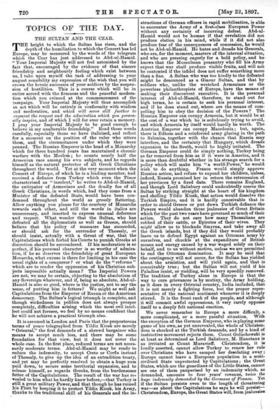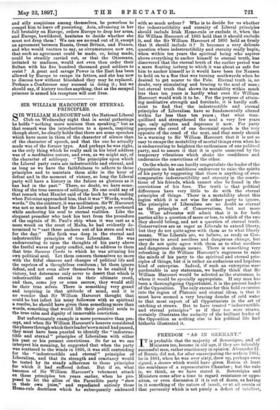TOPICS OF THE DAY.
THE SULTAN AND THE CZAR. THE height to which the Sultan has risen, and the depth of the humiliation to which the Concert has led Europe, may be measured by the words of the telegram which the Czar has just addressed to Abd-ul-Hamid. "Your Imperial Majesty will not feel astonished by the fact that, encouraged by the evidence of that sincere friendship and neighbourly feeling which exist between us, I take upon myself the task of addressing to your august sensibility my expression of the wish that you will crown the heroic successes of your soldiers by the suspen- sion of hostilities. This is a course which will be in entire accord with the firmness and the peaceful modera- tion which you evinced at the commencement of the campaign. Your Imperial Majesty will thus accomplish in act which will be entirely in conformity with wisdom Ind moderation, and which will serve still further to tugment the respect and the admiration which you person- ally inspire, and of which I will for ever retain a memory. I pray your Imperial Majesty to be good enough to believe in my unalterable friendship." Read those words carefully, especially those we have italicised, and reflect for a moment on the position of the ruler who utters them, and the circumstances under which they were penned. The Russian Emperor is the head of a Monarchy which for three hundred years has maintained a chronic warfare with the Moslem ; he counts nearly half the Armenian race among his own subjects, and he regards himself as the natural protector of all Greek Christians throughout the world. Yet at the very moment when the Concert of Europe, of which he is a leading member, had received a defiance from Turkey which even the Times characterised as " insolent," he writes to Abd-ul-Hamid, the extirpator of Armenians and the deadly foe of all Greek Christians, in words which, had they come from a Minister of the defeated State, would have been con- demned throughout the world as grossly flattering. Allow anything you please for the courtesy of Monarchs towards each other, and still the words in italics are unnecessary, and inserted to express unusual deference and respect. What wonder that the Sultan, who has defeated all the diplomatists as well as Greece, should believe that his policy of massacre has succeeded, or should ask for the surrender of Thessaly, or should insist, actually with a threat of war, that the Capitulations which forbid his Courts to punish Greeks at discretion should be surrendered. If his moderation is so perfect, if his personal character is so worthy of admira- tion, if he so deserves the friendship of great European Monarchs, what excuse is there for limiting in his case the usual rights of a conqueror ? or what do the " reforms " which are to render the oppression of his Christian sub- jects impossible actually mean ? The Imperial Powers are not, we may be certain, objecting to the absolutism of any Sovereign whatever, and if, being so absolute, Abd-ul- Hamid is also so good, where is the justice, not to say the sense, of putting him in fetters ? We might as well ask Capitulations from the Emperor of Russia or the American democracy. The Sultan's logical triumph is complete, and though wickedness in politics does not always prosper completely, difficulties arising which the most evil intel- lect could not foresee, we feel by no means confident that he will not achieve a practical triumph also.
It is assumed in London and Paris that the preposterous terms of peace telegraphed from Yildiz Kiosk are merely " Oriental," the first demands of a shrewd bargainer who means to accept much less, and there may be some foundation for that view, but it does not cover the whole case. In the first place, reduced terms are not neces- sarily moderate terms. Abd-ul-Hamid may be ready to reduce the indemnity, to accept Crete or Corfu instead of Thessaly, to give up the idea of an extradition treaty, and yet may be perfectly resolved to obtain a huge sum paid down, to secure some territorial expansion, and to release himself, as regards Greeks, from the burdensome fetter of the Capitulations. The result of the war has re- vealed to him what be hardly knew before,—that Turkey is still a great military Power, and that though he has ruined his Fleet by keeping it to protect Yildiz Kiosk, his Army, thanks to the traditional skill of his Generals and the in- structions of German officers in rapid mobilisation, is able, to encounter the Army of a first-class European Power without any certainty of incurring defeat. Abd-ul- Hamid would not be human if that revelation did not produce elation in his mind, while if it did not also produce fear of the consequences of concession, he would not be Abd-ul-Hamid. He hates and dreads his Generals, who are, for the moment, masters of the internal situation, and who are pressing eagerly for a bold policy, and he knows that the Mussulman peasantry who fill his Army expect that war shall produce visible fruits, and will not be contented if the infidel does not suffer something more than a fine. A Sultan who was too kindly to the defeated might be denounced as a Giaour Sultan, and that by soldiers who, unlike the wretched Armenians or the powerless philanthropists of Europe, have the means of making their discontent executive. It is the personal interest of Abd-ul-Hamid, therefore, to stand out for high terms, he is certain to seek his personal interest, and if he does stand out, where are the means of com- pelling him to obey the decision of the Powers ? The Russian Emperor can occupy Armenia, but it would be at the cost of a war which he is sedulously trying to avoid, and which Armenia by itself would hardly be worth. The Austrian Emperor can occupy Macedonia ; but, again, there is Edhem and a reinforced army glaring in the path to Salonica, together with the chance that Russia may interfere, and the certainty that Hungary, which dreads expansion to the South, would be highly irritated. The German Emperor could do simply nothing, Turkey being as far removed from him as if it were in America, and it is more than doubtful whether in his strange search for a policy which will make him " a world-Power," he would wish to do anything. France would simply approve Russian action, and refuse to expend her children, unless,. indeed, Russia promised her in return the retrocession of her provinces by a fixed date. There remains England, and though Lord Salisbury could undoubtedly coerce the Sultan by striking straight at the heart of his kingdom and shelling Yildiz Kiosk, that action would dissolve the Turkish Empire, and it is hardly conceivable that in order to shield Greece or put down Turkish defiance the Powers would abandon those jealousies of Great Britain which for the past two years have governed so much of their action. They do not care how many Thessalians are robbed of their cattle, or Epirotes of their wives. They might allow us to blockade Smyrna, and take away all the Greek islands, but if they did they would probably leave us to defend Egypt against an Ottoman army by ourselves, and chuckle at the expenditure of British means and energy caused by a war waged solely on their behalf, and to us without motive, unless we are permitted to end the Ottoman domination. It may be said that the contingency will not occur, for the Sultan has yielded about the armistice, and will yield again, and that is conceivably true ; but the Sultan will not yield if his Paladins insist, or yielding, will be very speedily removed. The tradition of Turkey alone in Europe is that the way to cure grievances is by mutiny, the Army holding, as it does in every Oriental country, India included, that it is not merely a fighting force, but the proper repre- sentative of the national sentiment whenever it is deeply stirred. It is the front rank of the people, and although it will commit awful oppressions, it very rarely opposes itself to a deeply felt national emotion.
We never remember in Europe a more difficult, a more complicated, or a more painful situation. With the exception of the German Emperor, who is playing some game of his own, as yet unrevealed, the whole of Christen- dom is shocked at the Turkish demands, and by a kind of instinctive movement rejects them. Count Goluchowski is at least as determined as Lord Salisbury, M. Hanotaux is as irritated as Count Muravieff. Christendom, it is loudly asserted, cannot allow Turkey to renew her rule over Christians who have escaped her desolating sway ; Europe cannot leave a European population in a semi- civilised State unprotected by Capitulations ; the Great States, which are the guardians of the Little States, cannot see one of them pauperised by an indemnity which, as demanded, amounts to four years' revenue, twice the huge indemnity demanded by the Germans of France. Yet if the Sultan persists even to the length of threatening war—as about the Capitulations he says he will persist— Christendom, Europe, the Great States will, from jealousies and silly suspicions among themselves, be powerless to compel him to leave off persisting. Asia, advancing in her full brutality on Europe, orders Europe to drop her arms, and Europe, bewildered, hesitates to decide whether she must not drop them I We can see no road out of it, except an agreement between Russia, Great Britain, and France, and who would venture to say, as circumstances now are, that such an agreement could be made, or, being made, could be steadily carried out, or that the Ottomans, irritated to madness, would not even then order their Sultan with his five hundred thousand good soldiers to resist ? A great and savage Power in the East has been allowed by Europe to escape its fetters, and she has now to discuss how without bloodshed they may be replaced. Perhaps a Conference may succeed in doing it ; but we should say, if history teaches anything, that as the escaped prisoner is armed his recapture will cost lives.







































 Previous page
Previous page